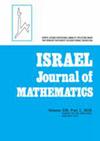Complete infinite-time mass aggregation in a quasilinear Keller–Segel system
IF 0.8
2区 数学
Q2 MATHEMATICS
引用次数: 0
Abstract
Radially symmetric global unbounded solutions of the chemotaxis system
$$\left\{ {\matrix{{{u_t} = \nabla \cdot (D(u)\nabla u) - \nabla \cdot (uS(u)\nabla v),} \hfill & {} \hfill \cr {0 = \Delta v - \mu + u,} \hfill & {\mu = {1 \over {|\Omega |}}\int_\Omega {u,} } \hfill \cr } } \right.$$are considered in a ball Ω = BR(0) ⊂ ℝn, where n ≥ 3 and R > 0.
Under the assumption that D and S suitably generalize the prototypes given by D(ξ) = (ξ + ι)m−1 and S(ξ) = (ξ + 1)−λ−1 for all ξ > 0 and some m ∈ ℝ, λ >0 and ι ≥ 0 fulfilling \(m + \lambda < 1 - {2 \over n}\), a considerably large set of initial data u0 is found to enforce a complete mass aggregation in infinite time in the sense that for any such u0, an associated Neumann type initial-boundary value problem admits a global classical solution (u, v) satisfying
$${1 \over C} \cdot {(t + 1)^{{1 \over \lambda }}} \le ||u( \cdot ,t)|{|_{{L^\infty }(\Omega )}} \le C \cdot {(t + 1)^{{1 \over \lambda }}}\,\,\,{\rm{for}}\,\,{\rm{all}}\,\,t > 0$$as well as
$$||u( \cdot \,,t)|{|_{{L^1}(\Omega \backslash {B_{{r_0}}}(0))}} \to 0\,\,\,{\rm{as}}\,\,t \to \infty \,\,\,{\rm{for}}\,\,{\rm{all}}\,\,{r_0} \in (0,R)$$with some C > 0.
准线性凯勒-西格尔系统中的完全无限时质量聚集
\left\{ {\matrix{{u_t} = \nabla \cdot (D(u)\nabla u) - \nabla \cdot (uS(u)\nabla v),} \hfill & {} 化学趋向系统的径向对称全局无约束解\fill \cr {0 = \Delta v - \mu + u,} \fill & {\mu = {1 \over {|\Omega |}}\int_\Omega {u,}}\fill \cr }}\right.$$ 在一个球 Ω = BR(0) ⊂ ℝn 中考虑,其中 n ≥ 3,R > 0。假设在所有ξ >0和一些m∈ℝ,λ >0和ι ≥ 0的情况下,D和S适当地概括了D(ξ)=(ξ + ι)m-1和S(ξ)=(ξ + 1)-λ-1给出的原型;1-{2\overn}\),可以发现一组相当大的初始数据 u0 可以在无限的时间内强制执行完全的质量聚集,即对于任何这样的 u0,相关的诺依曼型初界值问题允许一个满足 $${1 \over C} 的全局经典解(u, v)。\cdot {(t + 1)^{1 \over \lambda }}}||u( \cdot ,t)|{|_{{L^\infty }(\Omega )}}\le C \cdot {(t + 1)^{{1 \over \lambda }}}\,\,{\rm{for}\,{\rm{all}}\,t > 0$$ 以及 $$||u( \cdot \,,t)||{_{L^1}(\Omega\backslash {B_{{r_0}}}(0))}}\to 0\\,{\rm{as}\,t \to \infty\,\\,{\rm{for}\,\,{\rm{all}\,{r_0}\$$ in (0,R)with some C > 0.
本文章由计算机程序翻译,如有差异,请以英文原文为准。
求助全文
约1分钟内获得全文
求助全文
来源期刊
CiteScore
1.70
自引率
10.00%
发文量
90
审稿时长
6 months
期刊介绍:
The Israel Journal of Mathematics is an international journal publishing high-quality original research papers in a wide spectrum of pure and applied mathematics. The prestigious interdisciplinary editorial board reflects the diversity of subjects covered in this journal, including set theory, model theory, algebra, group theory, number theory, analysis, functional analysis, ergodic theory, algebraic topology, geometry, combinatorics, theoretical computer science, mathematical physics, and applied mathematics.

 求助内容:
求助内容: 应助结果提醒方式:
应助结果提醒方式:


